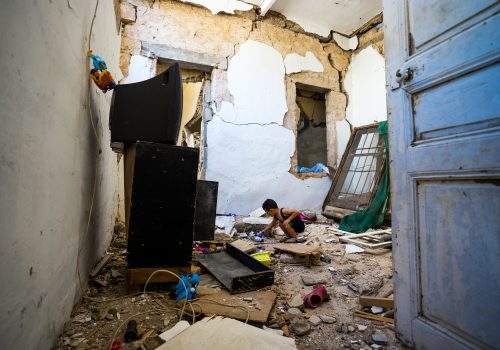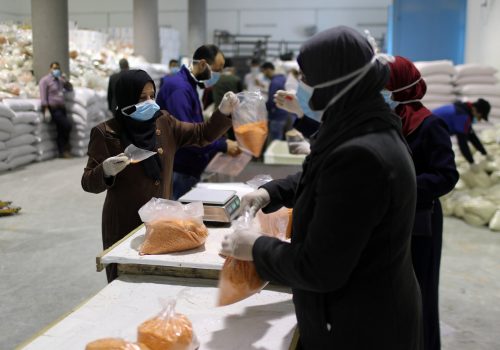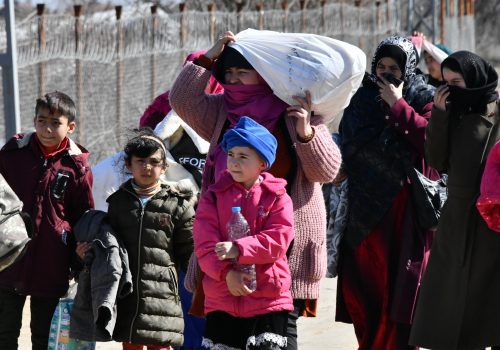UNRWA—and the Palestine refugees it serves—remains an investment worth protecting
2020 has been a year of unprecedented global tragedy and upheaval, most of all marked by the devastating COVID-19 pandemic. Though everyone has suffered, it is our most vulnerable communities that have been hit the hardest by the pandemic and its politicization, including a staggering 79.5 million refugees, asylum seekers, and internally displaced people across the globe.
Included in this figure are 5.7 million people who have been excluded in discussions of US humanitarian assistance: Palestine refugees.* Members of this constituency, who live in and around refugee camps throughout Syria, Lebanon, Jordan, the West Bank—including East Jerusalem—and the Gaza Strip, rely on the United Nations Relief and Works Agency for Palestine Refugees in the Near East (UNRWA) to receive lifesaving medical services.
Established in 1949, UNRWA is the only UN body responsible for delivering assistance, education, and protection to the 5.7 million Palestine refugees living in the Middle East today. UNRWA is mandated by the UN General Assembly to provide essential services to promote the well-being and human development of Palestine refugees until a just and durable solution to their plight is found.
This COVID-19 pandemic has only exacerbated the insecurity that refugees experience on a daily basis. Prior to the pandemic, the agency’s lifesaving programs, including 144 UNRWA health centers on the front lines, were facing supply shortages, including the procurement of medicines, and staffing cuts due to the Trump administration’s decision to sever all US funding in 2018, arguing that “the fundamental business model” of the agency “is simply unsustainable.” This decision singled out the Palestinian people as unworthy of US humanitarian assistance.
In spite of this, UNRWA is continuing its vital provision of healthcare, education, food distribution, and sanitation services, while also adapting these services to the necessary social distancing guidelines. Delivering assistance, education, and protection to refugees now means at-home e-learning, telemedicine, and door-to-door delivery of food and essential medicines.
The agency has operated for decades through conflict, wars, blockade, and occupation and is currently leveraging its on-the-ground expertise to respond to the COVID-19 pandemic. UNRWA’s experience of operating under emergency situations has given it a unique advantage in this global crisis.
For instance, UNRWA is working in close coordination with the World Health Organization to isolate, test, and treat all possible coronavirus patients and to trace all contacts. UNRWA has 3,300 health staff, who are refugees themselves, at its over 140 health centers combating the spread of the virus as the main—and sometimes sole—provider of primary healthcare to Palestine refugees. And, in the 711 UNRWA-operated schools across the region, the agency worked to move instruction online much more rapidly than even many school districts in the United States, due to its existing educational infrastructures such as UNRWA TV, mobile phone lessons, computer-based interactive learning, and a self-learning approach.
UNRWA is one of the only entities standing between a tragic COVID-19 outbreak among Palestine refugees and safe passage to the other side of this global crisis. Though the agency has the expertise to help Palestine refugees, it can only continue doing so with adequate and reliable funding.
Unfortunately, the Trump administration has maintained its position even throughout a deadly and highly contagious pandemic. In fact, at the onset of the pandemic and in a purely political move, the US doubled down on refusing to reinstate funding for UNRWA and all other NGOs that support Palestinians. This is no time for the politicization of humanitarian aid, especially when millions of lives hang in the balance. The humanitarian conditions in crowded refugee camps, which were already of great concern to the international community, are being exacerbated both by the current public health crisis and the solvable financial situation.
In October, the agency launched its latest COVID-19 appeal for $94.6 million but has only received a mere 5 percent of the funding needed to operate to date. Without sufficient and timely assistance from countries like the United States, refugees in the region may be left without critical resources for survival amid heightened unemployment and political instability in addition to the brutal pandemic. Tragically on November 9, UNRWA’s Commissioner-General Phillippe Lazzarini was forced to announce that the agency had finally run out of cash. If it does not receive funds this month, UNRWA will be unable to fully pay 28,000 UNRWA staff for November and December, including refugee healthcare workers and teachers.
Supporters of UNRWA remain committed to advocating for Palestine refugees across the Middle East and will continue to urge US officials to live up to our country’s reputation as a humanitarian leader. UNRWA remains an investment worth protecting and one that the Joe Biden administration must support.
Mara Kronenfeld is the executive director of UNRWA USA, an American nonprofit entirely separate from the UN agency that is dedicated to educating the US public about the plight of Palestine refugees, the work of UNRWA, and generating support for its programs.
*Palestine refugees are defined as “persons whose normal place of residence was Palestine during the period 1 June 1946 to 15 May 1948, and who lost both home and means of livelihood as a result of the 1948 conflict.”
Image: Vaccinations for children continue at a number UNRWA health centers in the Gaza Strip, with safety measures in place such as limited appointments, mask requirements and temperature screening for parents to help stop the spread of COVID-19. via UNRWA


